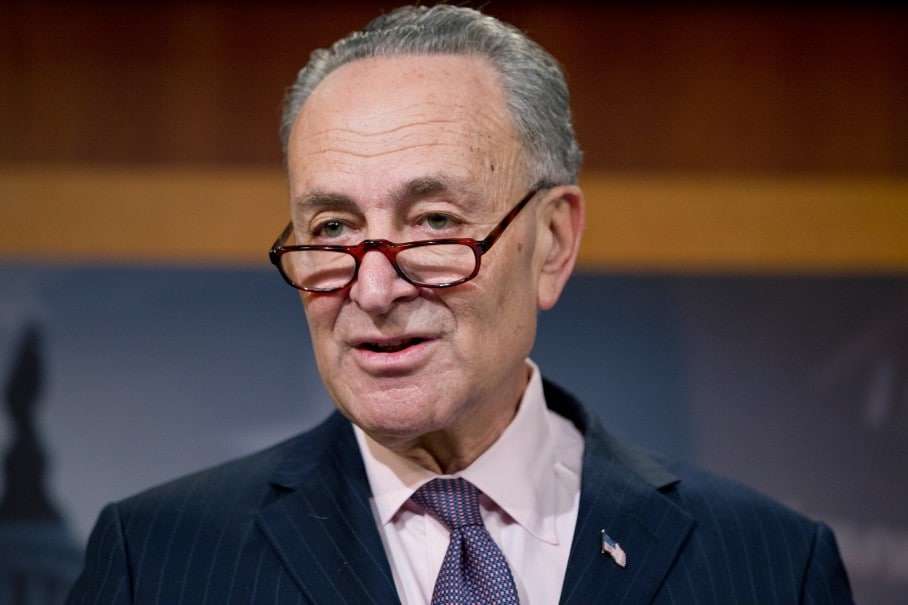The Volokh Conspiracy
Mostly law professors | Sometimes contrarian | Often libertarian | Always independent
Sen. Schumer's dissembling on judicial nominations

Sen. Charles E. Schumer (D-N.Y.) is upset that some Senate Republicans have announced their intention to prevent President Obama from filling a Supreme Court vacancy before the next election. I agree with Schumer that this sort of thing is bad for the judiciary, and I have long argued that all judicial nominees should receive prompt consideration and an up-or-down vote. But that's not Schumer's view, and it never has been. He should not pretend otherwise.
In 2007, 16 months before the election, Schumer delivered a speech at the American Constitution Society in which he declared that Senate Democrats should adopt a presumption against allowing President George W. Bush to fill another seat on the Supreme Court. (Here's the video.) From the text of his speech on the ACS website:
for the rest of this President's term and if there is another Republican elected with the same selection criteria let me say this:
We should reverse the presumption of confirmation. The Supreme Court is dangerously out of balance. We cannot afford to see Justice Stevens replaced by another Roberts; or Justice Ginsburg by another Alito.
Given the track record of this President and the experience of obfuscation at the hearings, with respect to the Supreme Court, at least: I will recommend to my colleagues that we should not confirm a Supreme Court nominee EXCEPT in extraordinary circumstances.
Schumer then closed by promising to "do everything in my power" to prevent a confirmation that could alter the ideological balance of the court.
This was a preemptive strike, as there was no vacancy at the time, and there is no question that, in pledging to do "everything in [his] power" to prevent a confirmation, Schumer was endorsing the same tactics he had been using for years to prevent the confirmation of judicial nominees he opposed.
Schumer now claims that all he meant was that Senate Democrats should vote against Bush nominees.
What I said in the speech given in 2007 is simple: Democrats, after a hearing, should entertain voting no if the nominee is out of the mainstream and tries to cover that fact up. There was no hint anywhere in the speech that there shouldn't be hearings or a vote. Only that if after hearings and a vote, Democrats determined that the nominee was out of the mainstream and trying to hide it, they should have no qualms about voting no. Nor was there any hint that this idea that Democrats should oppose hard right ideologues should apply only in the fourth year of the president's term. In fact, I said it should apply to this president, George W. Bush, or any future president whenever they nominated such a candidate.
Schumer's explanation does not face the laugh test. This is Donald Trump-level dissembling.
Schumer was well aware at the time that the only way to prevent the confirmation of a highly qualified conservative judicial nominee was to prevent that nominee from receiving an up-or-down vote. There was never a Senate majority in favor of blocking Bush's judicial nominees. While the Senate Democrats enjoyed a 51-49 majority in 2007, there were several "red state" Democrats who consistently voted in favor of Bush's nominees (and against filibusters of those nominees as well). This is why every Bush judicial nominee to any court who received an up-or-down vote was confirmed. Schumer did not have any way to block a Bush nominee other than by denying an up-or-down vote, and he knew it. By saying he would do "everything" in his power to prevent a confirmation, he was not limiting himself to voting against confirmation on the floor, just as he had never limited himself to that before.
Schumer was a persistent advocate of denying up-or-down votes to judicial nominees he opposed. Indeed, he was among the judicial filibuster's most ardent defenders at the time, arguing that judicial ideology alone was a sufficient basis to prevent an up-or-down vote on an nominee.
Schumer joined then-Sen. Barack Obama in voting against cloture on the nomination of Samuel Alito to the Supreme Court, as this was the only way to block his confirmation. In his 2007 speech, Schumer reiterated that this was the right thing to do, adding that he "should have done a better job" fighting Alito's confirmation. "My colleagues said we didn't have the votes, but I think we should have twisted more arms and done more." More votes for what? More votes to defeat cloture and prevent an up-or-down vote on the nomination, as this was the only way to keep Alito from sitting on the court.
Schumer also led the charge against the confirmation of Miguel Estrada to the U.S. Court of Appeals for the District of Columbia Circuit. Why? Because, as Schumer said at the time, he thought Estrada was a "stealth missile" and he did not want to allow Estrada to be placed in line for a Supreme Court nomination.
Schumer feared it would be too politically difficult to prevent confirmation of the first Hispanic nominee to the high court, so he did everything in his power to deny Estrada a simple up-or-down vote on the floor of the Senate - a vote that would have confirmed Estrada with bipartisan support. Seven cloture votes were filed on the Estrada nomination. Schumer voted against cloture each time. Subsequently, Estrada withdrew his name from consideration, nearly two-and-a-half years after he was first nominated to the D.C. Circuit. This is how Schumer blocked confirmations.
Schumer may want President Obama's nominee to receive prompt consideration by the Senate and an up-or-down vote, but he should not pretend this position is driven by anything other than partisan politics. Schumer and Obama would both have more support on judicial nominations today had they not themselves engaged in the obstruction of judicial nominees in the past.


Show Comments (0)